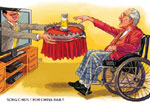Peace conference proposes new hope for Syria
Updated: 2013-05-31 02:58
By Chen Weihua (China Daily)
|
|||||||||||
With tensions easing on the Korean Peninsula, the expanding conflict in Syria has become one of the most talked about topics in the world today. Two years of fighting have left at least 80,000 people dead and more than a million homeless.
There was renewed hope earlier this month when Russia and the United States proposed that another peace conference on Syria be held in Geneva in mid-June.
Both the Syrian government and the opposition have so far agreed "in principle" to attend the meeting, although the divided rebel forces have yet to reach an agreement on their unified stance.
China said it is willing to actively participate in the second Geneva conference. The first one, presided over in June last year by former United Nations-Arab League envoy Kofi Annan, failed to halt the crisis.
Foreign Ministry spokesman Hong Lei said on Monday that China welcomes the proposal by Russia and the US to hold the international conference. He said China is ready to work with all related parties to push for a just, peaceful and proper resolution to the Syria issue as soon as possible.
However, the renewed hope took a hit when Britain and France on Monday successfully blocked the extension of a European Union arms embargo on Syria despite strong opposition from some of its 27 members. France and Britain said they had no plans to arm the rebels immediately, at least not before the Geneva conference.
Russia, which had previously agreed to the Western request to halt honoring a previous weapons deal with the Syrian government, condemned the EU move. "You cannot declare the wish to stop the bloodshed on one hand and continue to pump armaments into Syria on the other hand," Russian Deputy Foreign Minister Sergei Ryabkov said on Tuesday in Moscow.
In response, Russia said it now intends to go ahead with the arms shipment according to a deal inked long before the Syrian conflict started.
China also opposed the EU's decision. Foreign Ministry spokesman Hong said on Tuesday that action taken by the international community should be conducive to a cease-fire, ending the violence and a political solution to the Syria issue as well as to peace and stability in the Middle East.
The messages from the US are confusing. While Secretary of State John Kerry has been working hard with his Russian counterpart Larvov, hoping to make progress at the Geneva talks, White House spokesman Jay Carney and State Department spokesman Patrick Ventrel both expressed support for the EU's decision to let the arms embargo lapse, which opens the gate for EU members to supply weapons to Syrian rebels.
Carney, however, said the US opposes Russian shipments of arms, which include sophisticated S-300 air defense systems, to the Syrian government forces.
Israel, which already dragged itself into the conflict by bombing a military research facility inside Syria earlier this month that it suspected of shipping weapons to Hezbollah, said it will act if Russia goes ahead with the delivery of anti-aircraft missiles to Syria.
Analysts said China has not supported the crackdown by the Assad government. Instead, it has been using its influence to persuade Assad to make concessions.
Li Baodong, Chinese permanent representative to the UN, said two weeks ago that a political solution is the only right way out for the Syrian issue. "The future destiny of Syria should be decided by the Syrian people themselves," he said.
"We must respect the right of each country in the world to independently choose its path of development and oppose interference in the internal affairs of other countries," President Xi Jinping said during his visit to Russia in late March.
Xi and US President Barack Obama will surely compare notes on their approaches to the Syrian crisis when they meet in Sunnylands, California, on June 7-8, about 10 days before the Geneva conference.
Related Stories
Shadow cast on renewed hopes for peace in Syria 2013-05-30 11:48
Syria has no pre-conditions for dialogue: FM 2013-05-30 03:30
China willing to join Geneva talks on Syria 2013-05-27 19:25
Iran denies having forces in Syria 2013-05-25 08:00
Obama discusses Syria with senior Russian official 2013-05-23 15:13
Today's Top News
Thousands busted in identity theft cases
County official under investigation for nepotism
China not pressuring EU members on solar panels
Chinese tourists expenditure rise biggest
Italy removed from EU's deficit list
Germany to pay $1b for ageing Holocaust victims
Beijing seeks cooperation with US on cyberattacks
China to speed up service growth
Hot Topics
Lunar probe , China growth forecasts, Emission rules get tougher, China seen through 'colored lens', International board,
Editor's Picks

|

|

|

|

|

|





